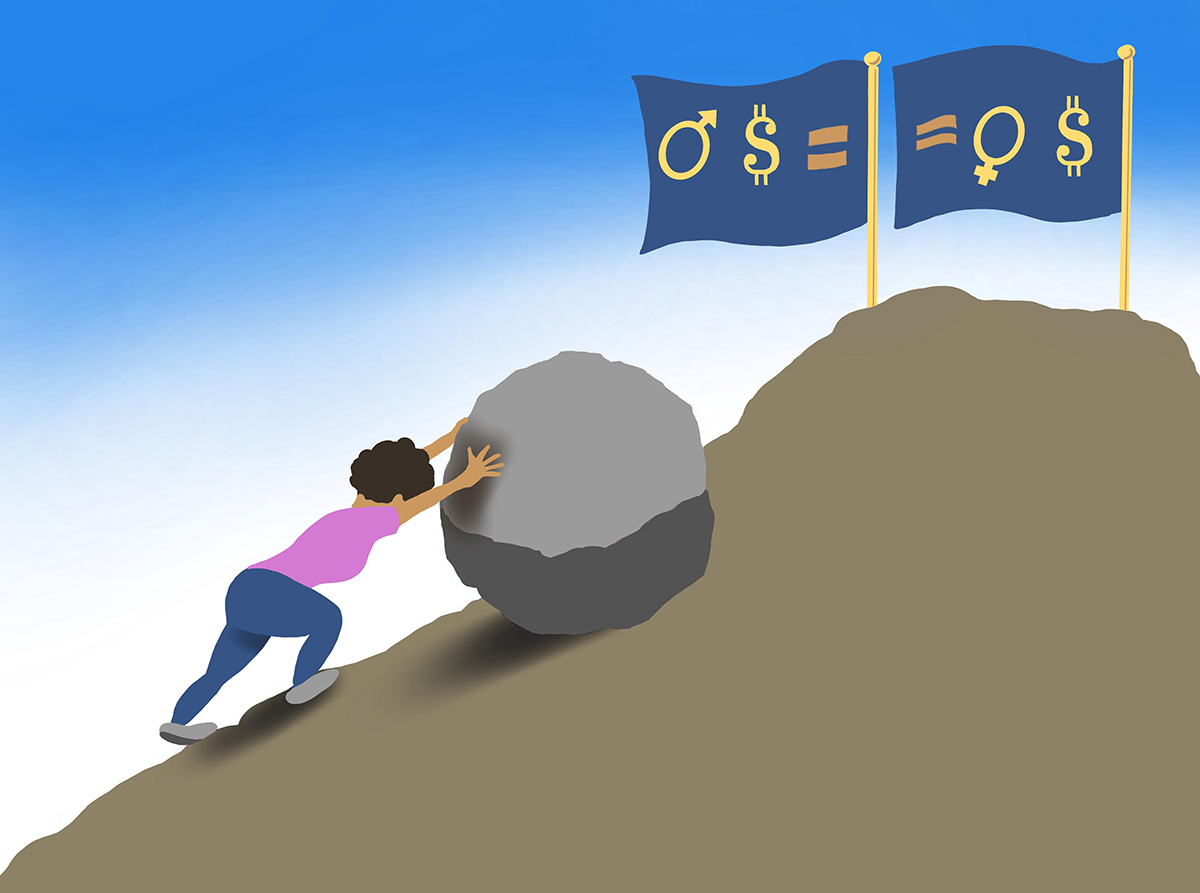When The New York Times declared, “America’s Mothers Are in Crisis” in February, it was hardly news to America’s mothers. Never an easy job, being a mom got a lot harder in the pandemic, exacting heavy tolls on virtually every aspect of their lives. We asked some experts what America’s moms deserve, and their responses cover policy prescriptions such as paid family leave, a living wage and affordable, high-quality child care, as well as simple hugs, gratitude and respect. (Note: Just because nobody mentions a phone call, a hand-made card or brunch, doesn’t mean those things aren’t important, too.)
 “American mothers have lost nearly 30 years of progress in the workforce over the last year. This Mother’s Day, let’s build a robust care infrastructure: child care and early learning for all; paid leave for all and long-term services and supports for our aging population and people with disabilities. We have a lot of lost ground to make up and it’s past time we got started.”
“American mothers have lost nearly 30 years of progress in the workforce over the last year. This Mother’s Day, let’s build a robust care infrastructure: child care and early learning for all; paid leave for all and long-term services and supports for our aging population and people with disabilities. We have a lot of lost ground to make up and it’s past time we got started.”
—Julie Kashen, Director, Women’s Economic Justice and Senior Fellow, The Century Foundation (read “It’s Time to Build a Comprehensive Child Care and Early Learning System”)
“To be listened to, valued and supported so that they can have reproductive and sexual well-being. Mothers deserve justice and joy.”
—Joia Crear Perry, MD, President, National Birth Equity Collaborative (read “Facing Facts, Finding Solutions in the Race Against Black Postpartum Depression”)
“Grace. The ability to be vulnerable is one that often times mothers are discouraged from doing and after a year in a global pandemic we need to give more grace to moms to be able to feel all the emotions of 2021.”
—Blanca Goetz (read “Young Mother Reflects on Risk Factors, Protective Factors and Using Personal Experience to Help Others”)
“Not just words but actions. I especially want to thank all the Black mothers, community Mamas, and early education providers who continue to help us heal during all the grief, trauma and tribulations, but also find joy and hope. I want for our country to truly thank our Black mothers and community Mamas by taking the burden, called racism and sexism, off their shoulders. Words of thanks are just not enough; actions that protect, promote and preserve their health, economic security and cultural excellence are needed even more so today.”
—Iheoma U. Iruka Thompson, Ph.D., Founding Director, the Equity Research Action Coalition, FPG Child Development Institute at UNC-Chapel Hill (listen: ‘Don’t Look Away’: Iheoma Iruka Confronts Bias And Inequities In Early Childhood Head-On)
 “A lot more than flowers and gestures of gratitude. Despite this one day of celebration, our mothers are taken for granted every other day of the year. We need a national reckoning that acknowledges that in order to achieve gender equity we must value women’s unpaid labor. We need to compensate moms for the work we do, we need high-quality, affordable child care, we need paid family leave, we need pay equity, and we need policies that make it possible for the millions of women who had to leave the workforce during the pandemic to return to work if they choose to.”
“A lot more than flowers and gestures of gratitude. Despite this one day of celebration, our mothers are taken for granted every other day of the year. We need a national reckoning that acknowledges that in order to achieve gender equity we must value women’s unpaid labor. We need to compensate moms for the work we do, we need high-quality, affordable child care, we need paid family leave, we need pay equity, and we need policies that make it possible for the millions of women who had to leave the workforce during the pandemic to return to work if they choose to.”
—Reshma Saujani, founder, Girls Who Code and the Marshall Plan for Moms
“National policies and federal investment in families and children, and changes in the way we think about and value caregiving.”
—Lynette M. Fraga, Ph.D., CEO, Child Care Aware of America (learn about their upcoming events)
“Our ongoing emotional support, resources and time to balance all of today’s demands on families.”
—Joan Lombardi, Early Opportunities (listen to The New Neighborhood podcast)
“Policies that allow them real choice in how to align their work and caregiving responsibilities, and a culture that doesn’t expect them to do each perfectly.”
—Elliot Haspel, author of Crawling Behind: America’s Childcare Crisis and How to Fix It (read his contributions to Early Learning Nation)
“A long nap. And after that, a supportive, well-paid village to help them care for and educate their children. It’s been more than a year of mothers working triple-time to provide for their families, school their children and run their households. Our child care system was abysmal and stressful before the pandemic, but for the last 14 months, it’s been absolutely unreasonable. I hope that this Mother’s Day, people pair their tokens of thanks to mothers with taking action to support policies that will help mothers thrive, 365 days a year.”
—Casey Stockstill, Assistant Professor, Sociology & Criminology, University of Denver (read “Unequal Beginnings: Daily Life in Segregated American Preschools”)
“To get half a day off where they have no responsibilities and can go do whatever they want without any distractions or interruptions.”
—Claudia Bojorquez, Director, Univision’s Social Impact Unit (read “Pequeños y Valiosos: Brain-Building Messages Hit Home with Hispanic Households)
“Moms all across America are their children’s first and most important teachers, and they deserve to be celebrated this Mother’s Day for all their tireless efforts in helping grow and develop our country’s future leaders.”
—Shane Garver, Associate Vice President, Rural Education, Save the Children (read about the Rural Library Network)
“To live in a truly family-friendly country. We deserve to be treated as full citizens where we make the same as our male counterparts, where there is no longer legislation with the goal of limiting our reproductive freedoms, and where our work at home and in the workplace are both valued as work.”
—Diana Limongi (listen to the Parenting & Politics podcast)
 “Understanding and support as they take on the tough and rewarding job of raising a baby. Paid family and medical leave to care; access to high quality, affordable child care; guidance and support in identifying and addressing developmental questions and concerns; and material support through tax credits and direct assistance programs, when needed, to navigate through those economically challenging years. In short, a society that cares about them, their babies and their family.”
“Understanding and support as they take on the tough and rewarding job of raising a baby. Paid family and medical leave to care; access to high quality, affordable child care; guidance and support in identifying and addressing developmental questions and concerns; and material support through tax credits and direct assistance programs, when needed, to navigate through those economically challenging years. In short, a society that cares about them, their babies and their family.”
—Matthew Melmed, Executive Director, ZERO TO THREE (discover the State of Babies 2021 Yearbook)
“A hug, a nap, and a vacation… and policies that better support parents and families.”
—Marley Jarvis, Ph.D., Institute for Learning & Brain Sciences, University of Washington (read “What Do Young Children Know about Race? You Might Be Surprised”)
“As the pandemic has highlighted, American mothers deserve equity. They deserve fairness in the workplace and equal compensation for equal work. They deserve access to affordable, high-quality preschool settings that permit for both their participation in the workforce and the safety and education of their children. They deserve paid family leave and access to health care. Above all, they deserve our unending respect.”
—Dr. Dan Wuori, Senior Director, Early Learning, The Hunt Institute (read their blog)
“To live in a country that is fulfilling its humanitarian duty to protect mothers and families seeking protection in the U.S.”
—Jennie Guilfoyle, Deputy Director of Programs, Immigration Justice Campaign (and my wife)
“The public’s gratitude as the too-often unrecognized heroes of the coronavirus pandemic. In the past year, mothers have borne a disproportionate share of the burden of work, domestic responsibilities, and managing their children’s learning and social emotional development. We have them to thank in perpetuity for the positive impact they will have had on this generation’s children during this time of global uncertainty.”
—Philip A. Fisher, Ph.D., Philip H. Knight Chair & Professor of Psychology, University of Oregon (read “A Year in the Life of a Pandemic”)
“Permission to take time for self-care. Over the past year, we’ve been running around, doing so much that it’s easy to forget that if you can’t take care of yourself, it’s hard to take care of others. That’s why I encourage the agency leaders, educators and parents that I work with throughout our Early Head Start & Head Start Network to come together to take care of ourselves, whether that be taking time at the beginning of a meeting to discuss what’s in our minds, fitting in a quick lunchtime walk or accessing available mental health supports.”
—Diana McClarien, Vice President, Early Head Start & Head Start Network at Start Early (read “Healthy Moms and Babies, One Videochat at a Time”)





